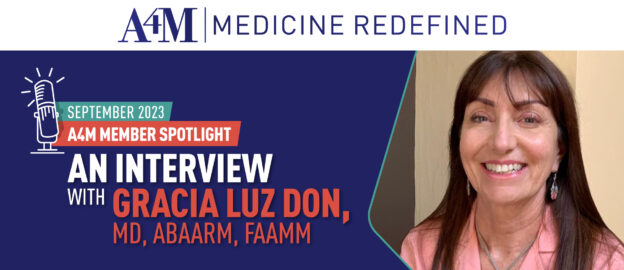We’re excited to spotlight Gracia Luz Don, MD, ABAARM, FAAMM, for this month’s A4M Member Spotlight.
Dr. Luz Don is the Chief of Cardiology Service at San Martín Hospital in Paraná, Argentina, and the founder of the Center of Healthy Life and Nutrition, a hub for anti-aging and regenerative medicine.
With cardiology, nutrition, and functional medicine expertise, Dr. Luz Don provides comprehensive care focused on disease prevention, lifestyle modifications, and personalized treatment plans.
In this interview, Dr. Luz Don shares insights into her diverse practice areas, her passion for innovative approaches to healthy aging, the value she gets from being a distinguished member of the A4M community, and her vision for the future of personalized healthcare.
Tell us a bit about your practice and focus areas in healthcare. What originally drew you to these specialties?
I am a physician in Argentina with expertise in cardiology, nutrition, and anti-aging medicine. My practice focuses on providing comprehensive, personalized care to enhance patients’ health and well-being. My journey into these specialties began with a passion for addressing cardiovascular diseases, promoting nutrition as a preventive measure, and exploring innovative approaches to health and aging.
What led you to join A4M originally? How has being part of this community impacted your career?
I joined A4M to stay at the forefront of anti-aging and regenerative medicine. Being part of this community has greatly benefited my career by providing access to cutting-edge education, networking opportunities, certifications, and resources that enhance my practice’s credibility and patient care.
How do you stay up-to-date on the latest research and innovations in your practice area? What resources do you find most valuable?
I stay current through medical journals, conferences, online databases like PubMed, medical associations, continuing education, clinical trials, literature reviews, healthcare news sources, and collaboration with peers and mentors. These resources are invaluable for staying updated in my practice areas.
What healthcare challenges are unique to your community? How are you addressing those needs?
Unique healthcare challenges in my community include limited access to specialized care, nutrition-related issues, economic disparities, an aging population, and healthcare infrastructure shortcomings. To address these needs, I engage in medical outreach, telemedicine, nutrition education programs, advocacy for equitable access, and specialized care for the aging population.
How has being an A4M Member benefited you in your practice? What value do you get from the membership?
Being an A4M member has benefited my practice by providing access to cutting-edge education, networking, certifications, evidence-based resources, advocacy opportunities, and enhanced patient trust. This membership adds credibility and keeps me updated on anti-aging and regenerative medicine.
What excites you most about the future of medicine in your specialty area? How do you see care evolving in the coming years?
The most exciting aspect of the future of medicine in my specialty is personalized, patient-centered care. I foresee care evolving with precision medicine, digital health, prevention emphasis, regenerative therapies, AI integration, and global collaboration, ultimately improving patient outcomes and quality of life.
If you could change one thing about healthcare today, what would it be and why?
I would ensure universal access to healthcare to promote equity, prevention, early intervention, reduced financial burden, improved public health, productivity, patient-centered care, innovation, and global health security, aligning with the principle that healthcare is a fundamental human right.
Will You Be Our Next Member Of The Month?
Would you like to be featured as part of our new A4M Member Spotlight series?
We take immense pride in each and every one of our members and their unwavering dedication to redefining medicine. To empower them in boosting their visibility and expanding their practice, we are excited to spotlight a different member each month.
The monthly spotlight will showcase your unique background, insights, achievements, and vision as an innovator shaping the next generation of healthcare. It’s an unparalleled opportunity to increase exposure, forge connections, demonstrate thought leadership, and inspire fellow members.
To become eligible to enter the running, join our global community of innovative health leaders today and complete the following steps:
- Follow @redefiningmedicine on Instagram.
- Share a post outlining your health professional goals, why you are passionate about anti-aging medicine, and how your A4M membership has benefited your practice.
- Use the hashtag #A4MMember and tag @redefiningmedicine.



